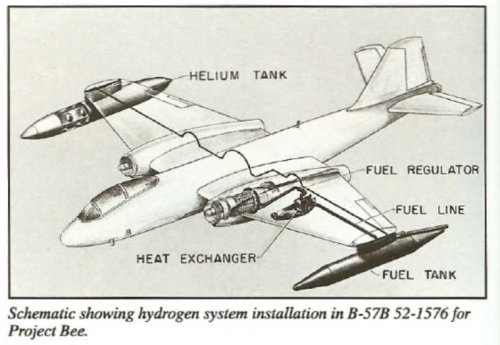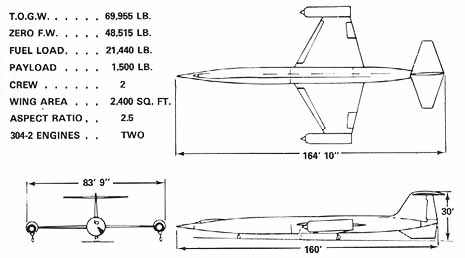I am just wondering if supplying compressed hydrogen to a gas turbine (combustor) would be a better fuel as it has three times the octane rating of kerosene. It just seems better all around.
-
6$\begingroup$ Related: Are there any programs to build a hydrogen powered airplane? $\endgroup$– foootCommented Jan 21, 2020 at 17:47
-
11$\begingroup$ "It just seems better all around." I would think the pressurized tanks to hold enough hydrogen would really be a factor in not using it. $\endgroup$– CrossRoadsCommented Jan 21, 2020 at 17:51
-
26$\begingroup$ Is octane rating even a factor in turbines? I don't think so, because it's a measure of how readily a fuel detonates ("knock") when compressed in a piston engine. Since many power generating turbines run on natural gas, the only obstacle to using hydrogen would seem to be the cost. $\endgroup$– jamesqfCommented Jan 21, 2020 at 18:18
-
6$\begingroup$ @jwenting That is not true, octane rating can be defined for hydrogen as well since the modern measurement methods are independent of actual octane content. According to Wikipedia, hydrogen has a RON of > 130. $\endgroup$– BianfableCommented Jan 22, 2020 at 10:52
-
13$\begingroup$ @jwenting I'm not aware that octane rating ever meant the proportion of octane in the fuel (I suppose there might have been variations in different countries?). Do you have any references to the contrary? The name comes simply from (a particular species of) octane being the benchmark of the conditions in which the fuel self-ignites. $\endgroup$– LuaanCommented Jan 22, 2020 at 11:56
6 Answers
Yes, indeed the plan to build a hydrogen-powered jet laid the groundwork for using hydrogen in the Centaur rockets and the upper stages of the Saturn 5. While hydrogen was used only experimentally in test rigs, the Soviet Union built a derivative of a regular airliner, the Tupolev 155, for testing hydrogen and natural gas in flight.
EDIT: NACA also did in-flight testing. Please see @jayhendren's answer for details.
So yes, the Tu-155 was indeed flown on several occasions with one hydrogen-powered turbofan. While the left and center engine remained NK-8s, the right engine was replaced by a NK-88 which was adapted for LNG and hydrogen. Other projects like one for a hydrogen-powered supersonic airliner sadly ended with the Soviet Union itself.
Tu-155 Cutaway view (picture source)
Hydrogen is also the prime propellant in hypersonic ramjets, but those are not turbines.
Hydrogen has a wide mixing ratio with air where it will burn. Also, being gaseous, it mixes much more quickly with air, so the combustion chamber can be small. When a converted J-57 was experimentally run on hydrogen in 1957,
The test engineers were agreeably surprised by the ease of engine operation. They ran it at full power and throttled back so far that the air fan was revolving so slowly the individual blades could be counted. Under this latter condition, the throttle could be opened and the engine would quickly and smoothly accelerate to full power. They found that the temperature distribution was good and there were no major problems.
But Niels is correct - its low density makes hydrogen problematic. As Alexis W. Lemmon, Jr., reported in May 1945 in his report on possible jet fuels (from history.nasa.gov):
"Although the liquid hydrogen-liquid oxygen system has by far the highest specific impulse performance of any system considered in this report, the low average density of the fuel components almost completely eliminates this system from all but very minor applications."
-
$\begingroup$ Thank you.... I was thinking compressed gas as similar to the auto makers solution.... Two tanks @ 60 liters each .... Is 55kg total weight $\endgroup$– SkyhawgCommented Jan 22, 2020 at 1:35
-
$\begingroup$ Tu-155 had only one engine (#3) running on LH/LNG, so it was just (a) hydrogen-powered turbofan. $\endgroup$– ZeusCommented Jan 22, 2020 at 5:51
-
3$\begingroup$ Airbus and Boeing also were planning hydrogen powered experimental jetliners, but AFAIK neither ever even built a prototype as it would be utterly impractical as the hydrogen tanks would have taken up the entire passenger cabin and cargo compartment. $\endgroup$– jwentingCommented Jan 22, 2020 at 6:14
-
$\begingroup$ @Zeus: I did not know that fact, but it turns out you are right. Corrected. $\endgroup$ Commented Jan 22, 2020 at 10:40
-
$\begingroup$ @Skyhawg The low density already takes compression into account. LPG isn't compressed gas - it's liquefied (it's even in the name - liquified petroleum gas). The same is true of oxygen-hydrogen tanks in rockets. Liquids cannot be compressed much. The density of liquid hydrogen is mere 70g/L - a kilogram of liquid hydrogen requires a 14 litre tank. And on top of that, it's much easier to liquify natural gas and keep it that way. $\endgroup$– LuaanCommented Jan 22, 2020 at 12:02
For fuels intended for use in aircraft, the key performance parameter is the energy density of the fuel: how much potential work is stored in how many liters of stuff. High energy density means the fuel tanks will be small and the energy released upon burning a liter of it will be large. The problem with using hydrogen as aircraft fuel is that its energy density is way lower than that of kerosene or diesel (because a liter of hydrogen at atmospheric pressure contains far less chemical potential energy than does a liter of kerosene), and squeezing it down to reduce its volume requires cryogenic refrigeration which hugely increases cost and weight, and the octane rating advantage of H2 is not balanced by these disadvantages.
Specifically regarding burning hydrogen in brayton cycle turbines, this is possible but economically impractical because the cost to make a liter of hydrogen is far greater than the cost to refine a liter of jet kerosene from crude oil.
-
13$\begingroup$ Energy/mass of H2 is great (not include mass of tanks). The problem with H2 gas is energy / volume. (litres not kilograms). Your answer defines energy density as energy / kilogram and then talks about volume >.<. en.wikipedia.org/wiki/Energy_density does define that term as energy / volume, so yes, energy density in that sense is the problem. Energy/mass is more properly called specific energy. $\endgroup$ Commented Jan 22, 2020 at 4:36
-
$\begingroup$ @PeterCordes yes, which is why Airbus and Boeing gave up on their plans for hydrogen powered airliners. $\endgroup$– jwentingCommented Jan 22, 2020 at 6:17
-
3$\begingroup$ @jwenting: I'm commenting only about terminology / wording, not the main point of the answer. (That it's impractical because of volume reasons, and/or mass of tanks / cryo equipment). Would be happy to upvote this answer once it's worded properly to actually say what it means :P $\endgroup$ Commented Jan 22, 2020 at 6:24
-
1$\begingroup$ You're right - energy density is the key. However, hydrogen has GREAT energy density; as the question states. The problem is that the hydrogen container is heavy; which means that the effective energy density is less $\endgroup$– UKMonkeyCommented Jan 22, 2020 at 14:38
-
1$\begingroup$ I want to point out that Wikipedia defines it the same way I do: "Energy density is the amount of energy stored in a given system or region of space per unit volume. Colloquially it may also be used for energy per unit mass, though the accurate term for this is specific energy." Based on this, hydrogen does NOT have GREAT energy density. $\endgroup$ Commented Jan 22, 2020 at 17:38
Von Ohain's first prototype of his HeS 3 turbojet, the HeS 1, burned hydrogen in the first runs. Only after some modifications was he able to make it work with a liquid fuel.
This is not fully on topic ('Aviation'), but answers the question in some way:
Hydrogen is currently considered the 'fuel of the future' for existing and new gas turbines in power plants, for small and large gas turbines equally. The industry is working to enable all existing turbine lines to handle that, and the modifications are minor (well, minor compared to the complexity of a modern gas turbine). Many models are already successfully enabled and proven, and the market is expecting to get the first requests soon.
Overall, it is quite easy to use hydrogen - just maybe not on an airplane.
The main reason to go for hydrogen burning is that it enables hydrogen storage as a battery - when there is extra power available (preferably solar or wind), it gets converted to hydrogen, and when the power is needed, it gets burned in existing gas turbines. This would allow to save trillions of existing investments in power plants by converting them into zero-emission hydrogen-burning plants.
[Disclaimer: I have a professional relationship to such a company; however, this is not restricted information]
-
$\begingroup$ Solar/wind/hydro conversion to stored Hydrogen is beautiful :) $\endgroup$– SkyhawgCommented Jan 23, 2020 at 5:15
-
1$\begingroup$ For non-aviation purposes the expected use is in fuel cells, not turbines. Fuel cells produce electricity, not heat. This frees them from the Carnot efficiency limit. Even in hydrogen cars, the weight penalty of a fuel cell plus electric motor is so small that the efficiency gains are worth it. In aviation, fuels cells would still mean you can have a smaller, lighter hydrogen tank, but the weight remains problematic either way. $\endgroup$– MSaltersCommented Jan 23, 2020 at 11:14
-
$\begingroup$ Yes, but on a mega macro scale it's perfect, and ground based electricity turbines can have huge hydrogen tanks. Windmills generate electricity, excess is used to split water and hydrogen, hydrogen is stored for wind lull. The bigger the better. Liquid Natural Gas will be much easier for aircraft (particularly ones that operate between terminals) and now is extremely inexpensive. $\endgroup$ Commented Jan 23, 2020 at 17:10
NACA (the predecessor to NASA), has burned hydrogen in a turbojet engine in flight.
There is an extensive history of NACA's and NASA's experimentation with hydrogen as a fuel on the NASA history website.
In the 1950s NACA burned hydrogen in a turbojet engine on a modified B-57 aircraft as part of Project Bee:
A technical report on the in-flight performance of the hydrogen-powered turbine was published and is available for download on the NASA website.
The experiments with hydrogen as a fuel source for turbine engines were successful enough that the Lockheed CL-400 high-altitude reconnaissance aircraft was designed to use hydrogen fuel:
Ultimately, however, the CL-400 was cancelled, although some of the research for this project made its way into the now-famous SR-71.
-
2$\begingroup$ This is great find, however, what is the helium tank used for? $\endgroup$– SkyhawgCommented Jan 23, 2020 at 5:19
-
4$\begingroup$ To pressurize the hydrogen fuel tank. Rockets powered by cryogenic fuels often use the same technique. $\endgroup$ Commented Jan 23, 2020 at 6:14
This 2018 paper might be what you're looking for: https://www.sciencedirect.com/science/article/abs/pii/S0360319917349005
Airbus suggests that an hydrogen fed turbofan would achieve a better efficiency than kerosene through higher compression
High auto-ignition temperature: Hydrogen’s high auto-ignition temperature enables higher compression ratios in a hydrogen engine compared to a hydrocarbon engine. A higher compression ratio results in greater thermal efficiency, or less energy loss during combustion.
However your question misses some points regarding hydrogen. High pressure is pretty much excluded so you'll have to consider liquid hydrogen at -252.9C, which makes storage a pain. If you don't insulate you'll have different mechanical properties due to low temperature. If you do insulate you add weight and points of failure.
Also, it has indeed a higher specific energy per kg but it's also much less dense. Combined with storage nightmare, gains from using hydrogen are not that straightforward.
Also, production losses (including energy to liquify) do not help hydrogen's case cost-wise.



